Disability Community in Travis County Grapples with Parking Abuse
By Taylor Jackson Buchanan
Photography By John Flynn and Shelby Light
Reporting Texas
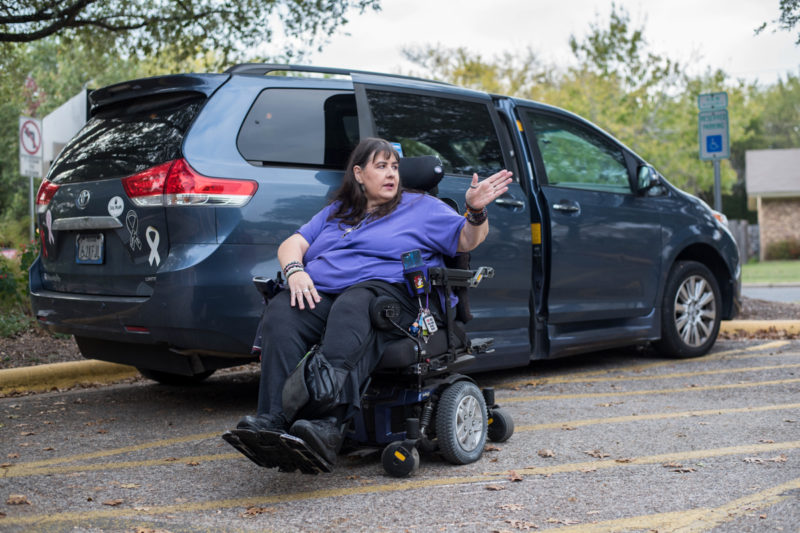
Cynthia Dietz, diagnosed with muscular dystrophy in 2009, has been using a chair since 2013. She shows the exit area for van accesbile parking spots. Many cars park in these spots, blocking her from exiting her van. John Flynn/Reporting Texas
Mack Marsh dove into the wrong end of a swimming pool in 2001. He spent 28 days in a coma and four-and-a-half months in a rehabilitation hospital. The mishap severed his spine and limited his mobility. Additionally, his body could no longer regulate its temperature, something he did not learn until a year later.
On a hot summer day, Marsh and his 4-year-old son attended a minor league baseball game in Shreveport, Louisiana. Leaving the game in his wheelchair, Marsh discovered a car parked on the striped zone next to his van, preventing him from deploying his ramp to get inside.
“I didn’t know what to do,” Marsh said. “I had no experience with how this works.”
His son ran to find help. But it was too late. Marsh passed out from heat exhaustion and had to be rushed to the hospital.
“When I woke up, I was mad,” Marsh said. “From then on, whenever I saw someone parked illegally, I called them out.”
But Marsh quickly learned that confronting a violator leads to more frustration and prevents a change in behavior. In 2012, he co-founded Parking Mobility, an international nonprofit based in Texas that works to educate communities about what the organization believes to be the “No. 1 health, safety and access issue facing people with disabilities.”
When a driver parks a vehicle in a handicap-designated space without a permit or blocks the adjacent striped zone, the impacts on health, safety, independence and economics are more than an inconvenience, according to Marsh. What’s more, violations are more common than most realize. One in four handicapped spots are blocked or taken without a permit on an average day, based on data from Parking Mobility. In inclement weather and on busy shopping days, that number jumps to three in four.
For Cynthia Dietz, a protected place to park ensures her ability to thrive despite limited functionality. Dietz was diagnosed with muscular dystrophy in December 2009. She continued working as a kindergarten teacher – a career that spanned 30 years in all – despite a breast cancer diagnosis two months later and deteriorating mobility. At first, she needed the help of a single pole cane, then a quad-pronged cane and, finally, a wheelchair. She and her husband purchased a Toyota minivan and had it modified to meet her needs. She continued to work until her retirement in 2015.
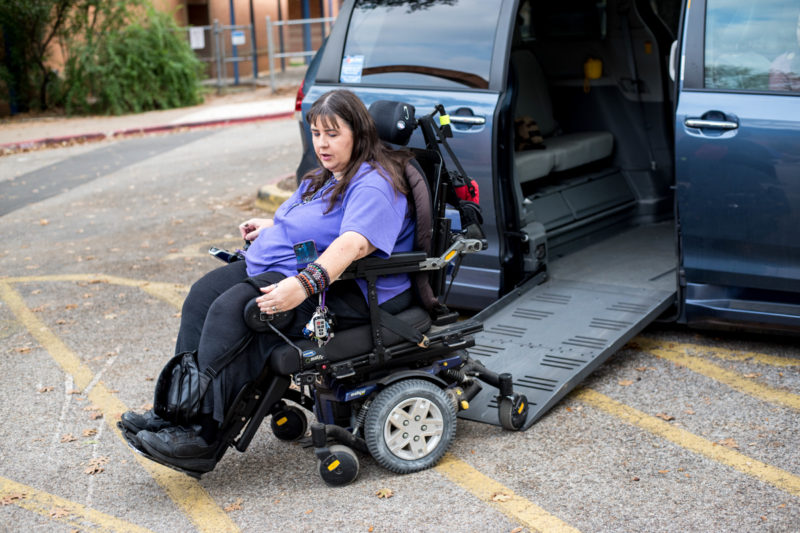
Dietz shows the exit area for a van-accessible parking spot. John Flynn/Reporting Texas
“I’m not putting my feet up and eating bon-bons,” Dietz said. “I’m still volunteering at my school, meeting up with friends, running errands, going to see shows.”
When Dietz can’t find a protected place to park, she finds adjacent, empty spaces and straddles her van across them so she can extend her ramp. To get to her destination, Dietz must navigate her chair down the middle of a parking lot lane. Most Texas trucks and some SUVs are higher than her chair, and on several occasions a driver, unable to see her, has started backing a vehicle toward her.
“It’s scary,” Dietz said. “My husband hates for me to go do things by myself, but that was the reason for getting the ramp van. I can go about my life independently.”
Wayne Napier has used a wheelchair since being injured in a car accident as a teenager. A former patent illustrator, Napier is now retired and is looking for ways to spend his money and his time.
“My wife and I have got a fair amount of scratch to spend,” Napier said. “Businesses ought to be aware that if they don’t have the proper spacing [for accessible parking] we may not go there.”
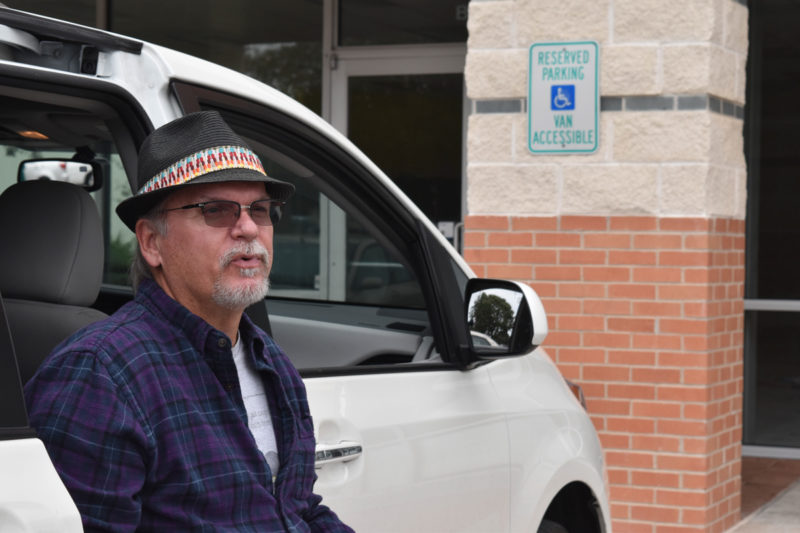
Wayne Napier demonstrates why accessible parking is crucial for people with disabilities. Shelby Light/Reporting Texas
The community of people with disabilities and mobility impairments is the third-largest consumer segment in the country, according to a 2009 fact sheet by the U.S. Department of Labor. With 54 million people plus their families and friends, the government estimates this group has $1 trillion in purchasing power. If they cannot find a place to park at the grocery store or safely navigate into a restaurant or the movie theater, the economy suffers.
“We want to make sure people are actively engaged in their communities,” Marsh said. “We want them working, earning, paying their taxes.”
However, due to a variety of factors, accessible parking is not the No. 1 priority for people outside the disability community. Law enforcement lacks the time and resources to address the problem and has more urgent priorities than responding to a hotline call about someone parked in a handicapped spot, according to Marsh.
“It’s a low-priority call,” Marsh said. “They’re not going to come lights and sirens blaring, guns drawn. By the time they get there, more often than not, the violator is already gone.”
What’s more, Texas has one of the highest fines in the country – up to $500 – for handicapped parking violations. Marsh says that compounds officers’ hesitancy to write tickets and gives prosecutors and judges an incentive to dismiss the few citations that do get written. On average, across the country, Parking Mobility found an 80 percent dismissal rate for the violations. Violators learn that parking in a handicapped spot is a citation they can get out of, so they continue to park illegally.
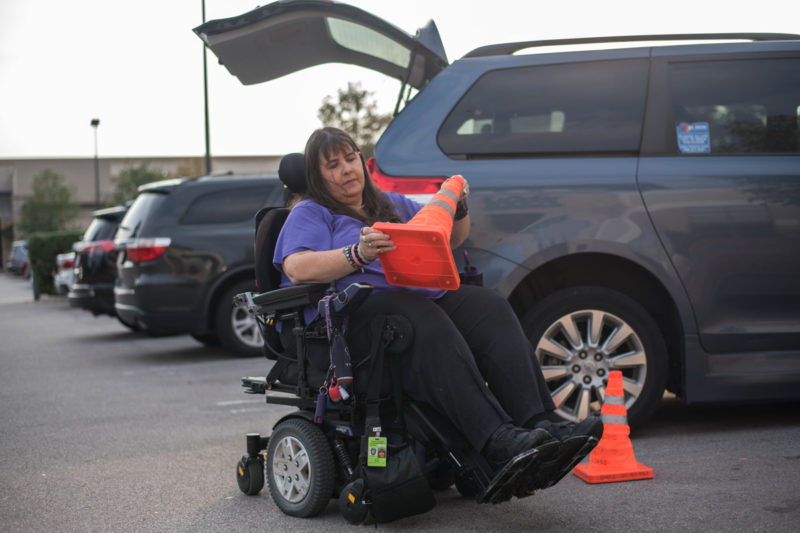
When there are no van accessible handicap spots available, Dietz parks across two spots, and uses cones to block off an area for her to exit. John Flynn/Reporting Texas
Travis County has contracted with Parking Mobility to make a dent in the problem. Here’s how it works: Trained volunteers take an oath before a Travis County constable and download an app. When they see a parking violation, they take photos of the license plate, the violation and the handicapped parking sign and generate a report, which goes to a constable to review. The 112 active volunteers in Travis County are not asked to patrol. They do not have to meet a quota or log a certain number of hours.
“We want them living their lives – going to work, the doctor, a restaurant, the movies, grocery shopping,” Marsh said. “We’re not vigilantes. We’re not out to get people in trouble. We just look around and report violations we see.”
After a report is logged in the app, a constable certifies it, usually within a few days, and generates a citation. Parking Mobility’s system searches the Texas Department of Motor Vehicle’s database to pull up information including the name of the person the car is registered to, address, license plate and the make and model of the vehicle. Lee Willis, senior constable deputy in Precinct 3, says the process has simplified his job, and he now spends five to seven minutes a day on handicapped parking violations.
A citation is then sent to the justice of the peace in the precinct in which the violation occurred. The JP’s office opens a case and mails the ticket to the offender.
After the ticket is mailed, the defendant has 45 days to respond. If they call the office to say “I’m not guilty” or “I want to talk to a prosecutor,” they get a pre-trial conference.
Prosecutors hear that person’s excuse, look at the evidence and determine whether to file the case or dismiss it.
Part of the reason dismissal rates tend to be so high is a lack of transparency throughout the process, according to Marsh. Prior to the contract with Parking Mobility, the county wasn’t tracking its data, he said.
“Transparency is critical,” Marsh said. “When the judges found out they had an 80 percent dismissal rate, they decided they needed to fix it.”
Now, a third option is available for prosecutors and judges to respond to these tickets. Through Parking Mobility, violators have the option to take an offender education program instead of paying the $500 fine, which Marsh believes is too high. The educational component is key because it gives prosecutors and judges a way to hold people responsible without having to enforce a high fine and speaks to the broader need for more education about the issue.
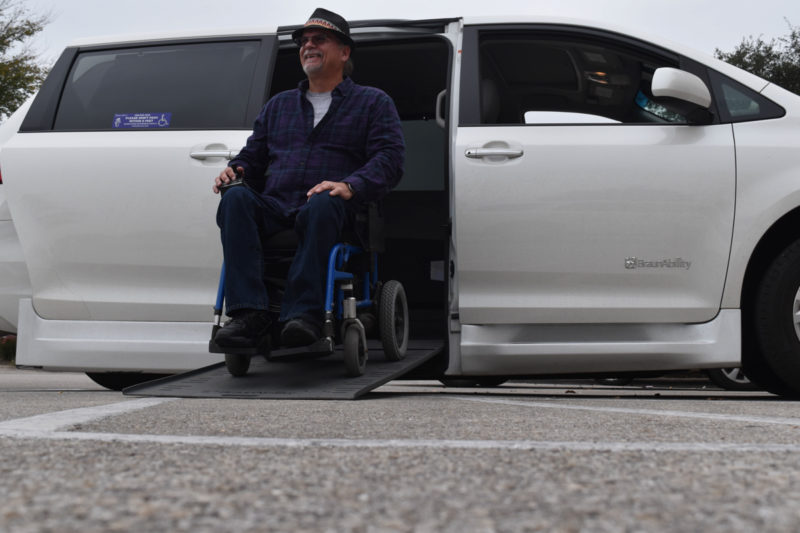
Napier deploys his ramp and exits his vehicle outside an Austin-area HEB. Shelby Light/Reporting Texas
The model has proven effective. Parking Mobility first partnered with Hays County in 2012. In five years, the course has a zero percent recidivism rate. Six people who have taken the class have become volunteers with the group, passionate advocates for the disability community. By comparison, people who complete a defensive driving course for speeding tickets have about a 60 percent recidivism rate.
“Our volunteers’ in Hays County biggest complaint? They can’t find violations to report,” Marsh said. “We’ve reduced violations by 80 percent there.”
In 2013, Parking Mobility took the results from Hays County to Travis County.
“We wanted to prove that it was scalable to an urban area,” Marsh said. “They were a little hesitant, but we proved in the pilot that it worked.”
As of November, the group had reported 4,480 accessible parking violations since Jan. 1 in Travis County. Reports are falling, which Marsh said is a sign that fewer people are violating. And the county cleared $143,000 more than the program cost last year, according to Parking Mobility’s data.
“We see localized decreases based on where our volunteers live and work,” Marsh said. “We just need more people in the program with a larger urban area. We still see that zero percent recidivism in Travis County. We’re really proud of that, and we know that’s the key.”
Four of the five precincts in Travis County have seen dismissal rates fall from about 80 percent to 30 percent. However, Marsh said from September 2016 to September 2017, 825 reports submitted by Parking Mobility volunteers, certified by the constable and sent to Justice of the Peace Precinct 5, covering central and west Austin, were dismissed before a case was even opened, according to the group.
“If we’re going to solve the problem in Travis County, we have to have the backing of the JP,” Marsh said. “The county’s already paid for it. We’ve proven that this works in the other precincts and in other counties. We just need [the Justice of the Peace] to hold violators accountable.”
Precinct 5 Justice of the Peace Nicholas Chu, who took office in May 2017, did not respond to requests for an interview. However, court data from that same period shows a 79 percent dismissal rate for all handicapped parking cases in Precinct 5. The data did not clearly indicate whether Parking Mobility’s 825 certified reports were even given a case number. Without their partnership, Parking Mobility fears the success of its program in Travis County will be jeopardized.
One in five Americans have a disability or mobility impairment, according to Census data. Nine out of 10 people are directly related to someone with a disability.
“Whether you realize it or not, this issue impacts you,” Marsh said. “It either impacts you because you know someone with a disability who has these struggles, or it impacts you economically or socially. You never know what amazing, creative, passionate people you miss when people with disabilities aren’t part of our community. We need to think about how our actions may hinder others from being active in our circles.”
For Dietz, accessible parking is key to living a full life.
“If I decide I just need to run to the grocery store, I want to be able to do that without worrying about whether there will be a place to park,” she said.
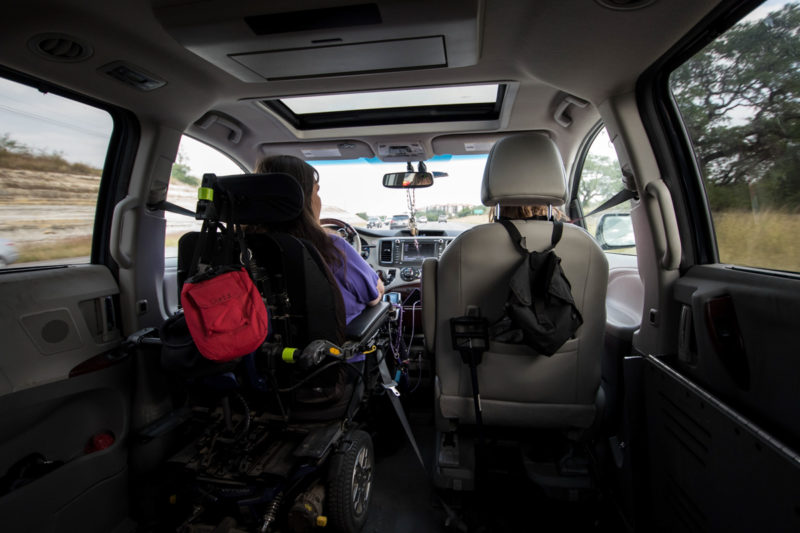
Dietz uses a specialized van so she can drive. She uses two levers by her hand as the brake and accelerator. John Flynn/Reporting Texas